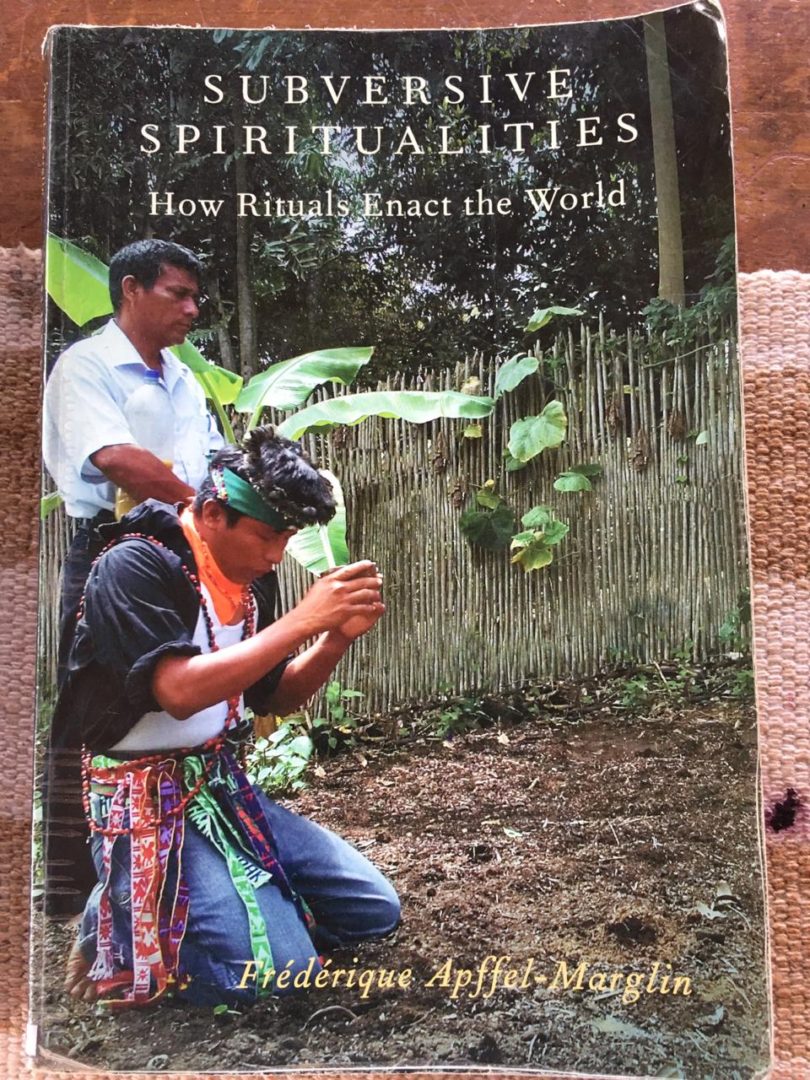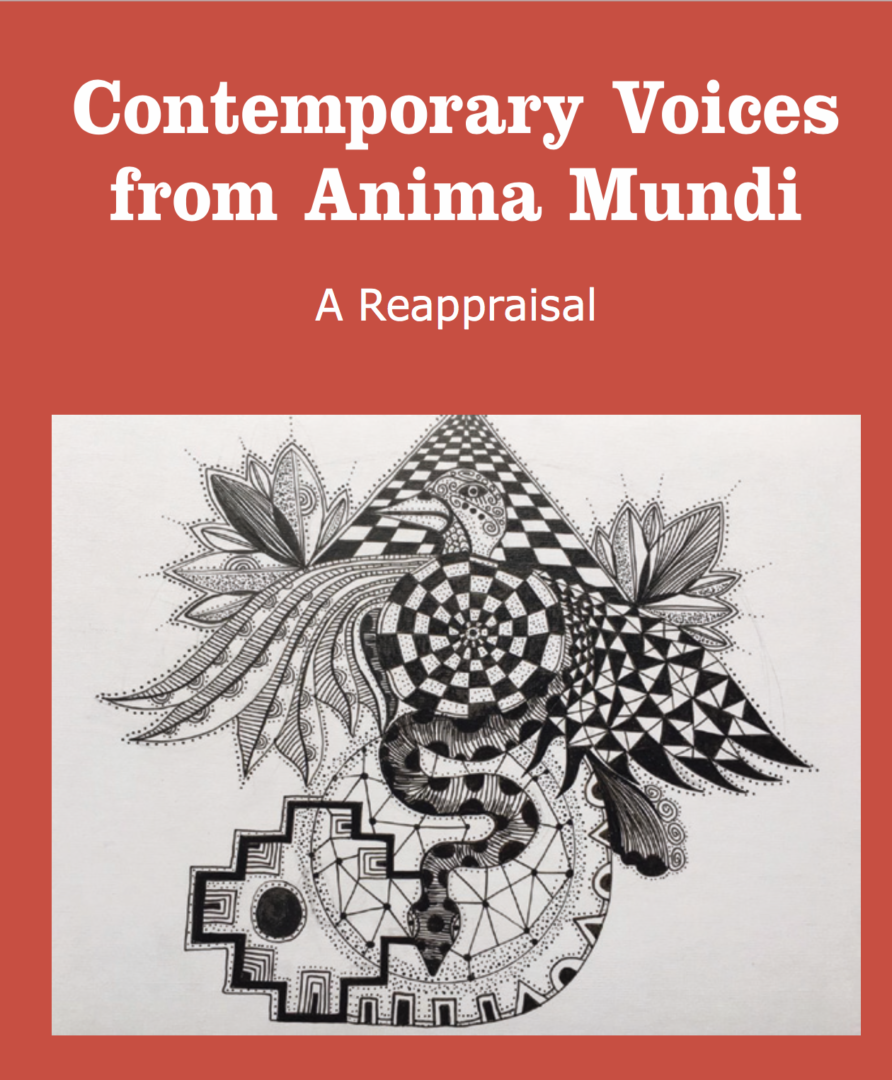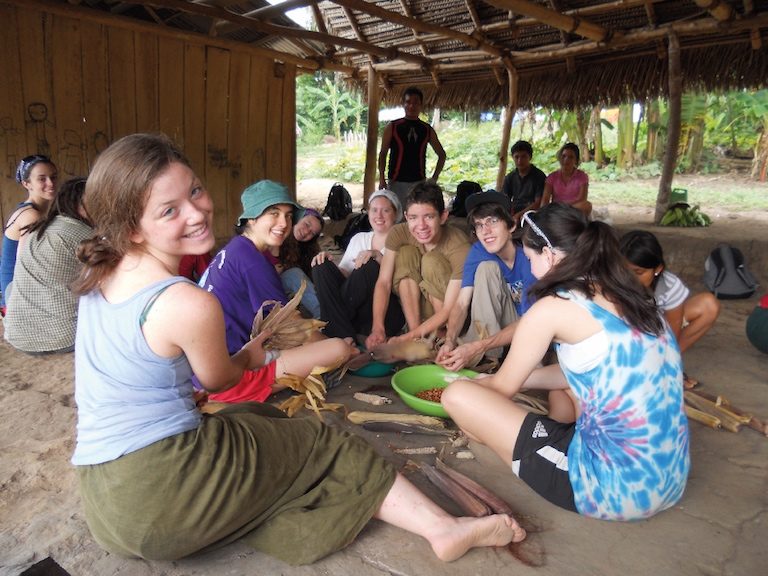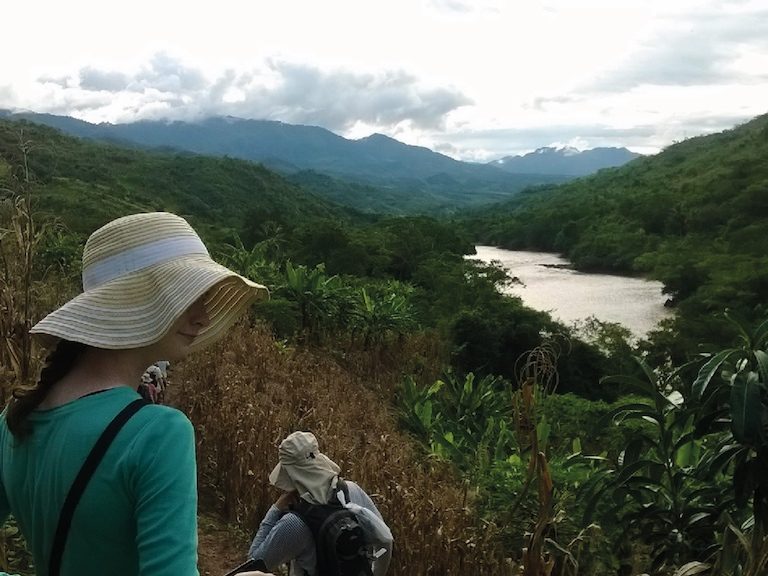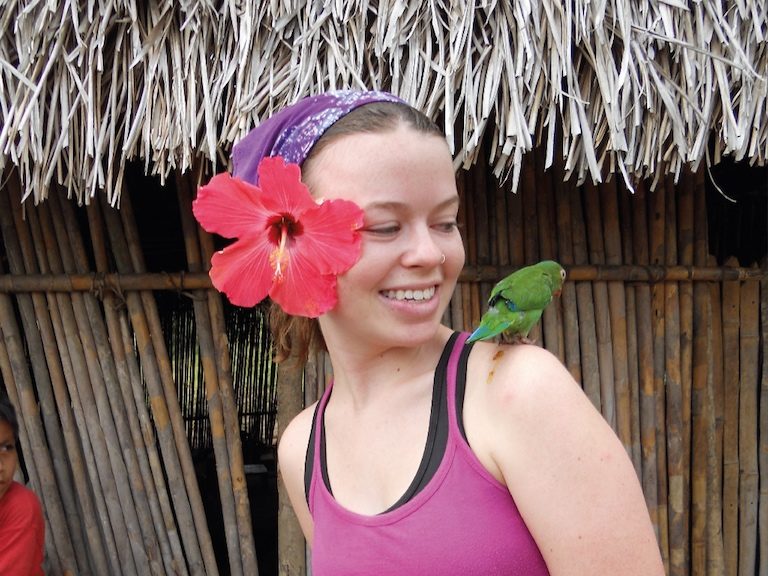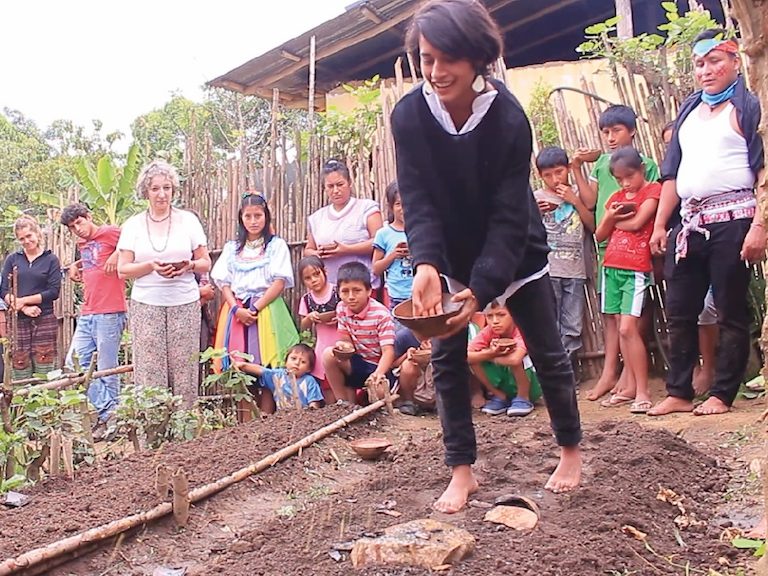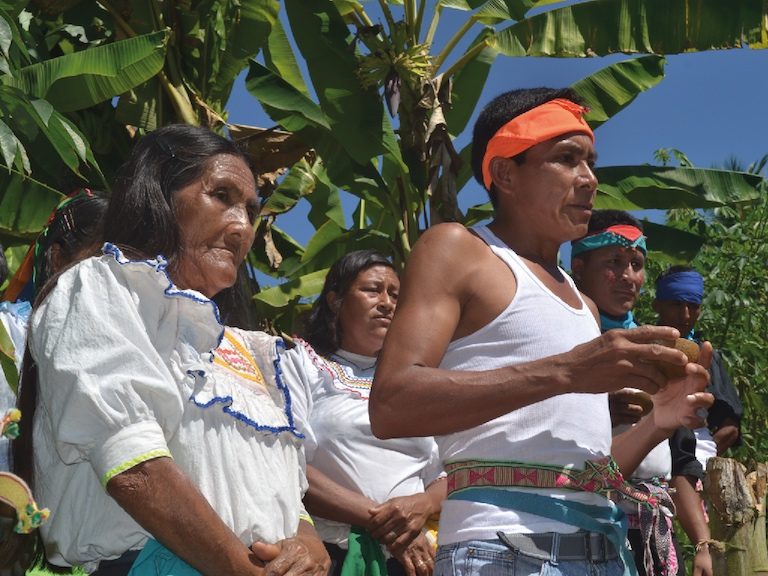The Sachamama Center Association (ACS) is a non-profit organization in the Peruvian Upper Amazon with a field station in the city of Lamas, Department of San Martín, Peru. The association, in collaboration with the indigenous Kichwa-Lamas, descendants of the pre-Columbian inhabitants, works to regenerate the so-called “anthropogenic” pre-Columbian Amazonian soil, a fertile and ancient soil, also known as Amazonian Black Earth (Terra Preta do Indio in Portuguese) or Yana Allpa in Quechua. ACS was founded in 2009 by anthropologist Frédérique Apffel-Marglin and is chaired at Lamas by Randy Chung Gonzales, who has worked closely with Dr. Apffel-Marglin since her founding. The center also shares with the Kichwa-Lamas a worldview where humans, non-humans, as well as the community of spirits, are kin to each other. ACS treats nature as a "you" rather than an "it." The non-profit organization also exists in the US under the name “Sachamama Center for Biocultural Regenration”. By "biocultural regeneration" we mean honoring this integration of all life, as well as the cyclicality of its rhythms. It is also intended to obviate backward/advance implications of more linear formulations.
Today the center is bringing together an expanding collective of academics, activists and students who cross the North-South divide. The center's mission is to integrate knowledge and spirituality, activism and research, biocultural regeneration and fair economic practices, with the aim of promoting intercultural dialogue. The mission is to strengthen the ancestral legacies and other practices of the Kichwa-Lamas and other local groups in dialogue with them, as well as to regenerate the pre-Columbian Amazonian Black Earth. This soil is called by archaeologists “anthropogenic, that is, made by humans. However, we at the center prefer to call it a “cosmogenic soil”, because it is made by humans as well as by all the spirits of the cosmos. It should be added that this soil is one of the most fertile and sustainable soils in the world. Likewise, the carbon 16 tests date the oldest layers of this soil back 8,500 years. This cosmogenic soil was developed by the first Amazonian civilizations discovered in the last century by archaeologists. The first civilizations in the Americas were made possible in the Amazonian basin due to the great fertility and productivity of this cosmogenic soil. These soils made possible the growth of the first complex civilizations of the Americas in the Amazon basin. Archaeologists have discovered cities along as much as 30 km along rivers. Ceremonial complexes were discovered with straight and wide avenues connecting different centers and cities. The oldest civilizations in all of the Americas first emerged in the Amazon basin and over the years were established in the Upper Amazon and later in the Andes. The oldest ceramics in all of the Americas come from the Amazon basin. This cosmogenic soil, and the complex civilizations it made possible due to its high fertility and productivity, spread to the Chachapoyas culture and then to other regions of the Andes Mountains. The Amazon forest is not a virgin forest, but a fertile garden where humans and the spirits of nature worked together in harmony.
The center also produces biochar, a charcoal with the capacity of sequestering CO2 from the atmosphere, a biochar produced in its own ovens. Our homemade ovens to produce biochar allow us to sequester 20% of greenhouse gases from the atmosphere. Biochar is a soil regeneration technology that has a potential impact to positively influence climate, food, energy and water security. Biochar is one of the few technologies that can capture and neutralize atmospheric CO2 for centuries, thereby making a crucial contribution to solving the climate crisis.
We also practice and teach a simpler method, called Regenerative Agriculture, that does not require biochar ovens (see below for explanation). Both methods are taught to new generations to stop deforestation, improve local agriculture and help solve the climate crisis. The ACS is an experimental research center that regenerates pre-Columbian Amazonian black soil with biochar, promotes regenerative agriculture using composting and terracing to achieve food security for small farmers and also mitigate the climate crisis. We also collaborate with the Kichwa-Lamas.
The ACS operates from the beautiful local of Hospedaje Sangapilla (www.hospedajesangapilla.com), which has a restaurant (Anturios), a large auditorium, an ecological pool, a complex of buildings and lush gardens designed collectively by the Sachamama team. The architectural vision of Hospedaje Sangapilla is based on the design of local indigenous and ecological technology. Hospedaje Sangapilla is located on the outskirts of Lamas on one hectare of forest, with panoramic views of the Escalera Mountain Range. The ACS is registered in Peru as a non-profit organization with address Jr. 16 de Octubre 114, Barrio Suchiche, Lamas, San Martín, Peru. For more information contact…
SCBR PERMANENT PROJECTS
Chacra-Huerto Project
In several indigenous communities in the Lamas region, the Sachamama Center has dedicated itself to regenerating pre-Columbian soil discovered in the last century by archaeologists. These soils are still fertile today. The reddish clay of Amazonian soils is known for its poverty in nutrients. Slash-and-burn agriculture (also called 'shifting agriculture') has become a major source of tropical forest loss. Although it allows the forest to regenerate, it is very inefficient and environmentally damaging under current land tenure patterns. Burning releases a large amount of CO2 into the atmosphere. Shifting agriculture is the third source of CO2 emissions in the Amazon basin. In the Lamas region, furthermore, population density has become too high for this type of agriculture to be sustainable and is also leading to a higher rate of deforestation throughout Peru, behind the ravages of industrial agriculture and oil exploration in the region.
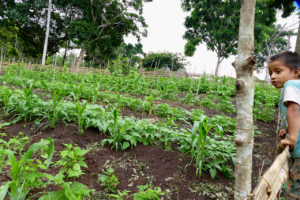 Teams of American and Brazilian archaeologists in the 1960s began excavating sites in the Amazon region where what Brazilians call terra preta de indio (black Indian soil) is found. These soils are still fertile today. Carbon evidence from the oldest layers of terra preta dates back to 8,500 years ago. The key to the amazing sustainability of these anthropogenic soils is a mixture of biochar, (see below for this term), microorganisms, organic matter and a large amount of broken ceramics. Nutrients adhere to the biochar since biochar does not decompose in the soil. Microorganisms give life to the soil and broken ceramics allow a positive exchange of ions that increases fertility.
Teams of American and Brazilian archaeologists in the 1960s began excavating sites in the Amazon region where what Brazilians call terra preta de indio (black Indian soil) is found. These soils are still fertile today. Carbon evidence from the oldest layers of terra preta dates back to 8,500 years ago. The key to the amazing sustainability of these anthropogenic soils is a mixture of biochar, (see below for this term), microorganisms, organic matter and a large amount of broken ceramics. Nutrients adhere to the biochar since biochar does not decompose in the soil. Microorganisms give life to the soil and broken ceramics allow a positive exchange of ions that increases fertility.
At Sachamama we have successfully regenerated this black soil of the Indians which we call by its Quechua name: Yana Allpa, using biocarbon/biochar produced with a variety of agricultural biomass, such as dried coconut shells. Biochar is the result of carbonizing biomass with little or no oxygen at high temperatures, a method called pyrolysis. We mix this biochar with freely available locally organic manure as well as with our own compost. Added to them are microorganisms gathered on the rainforest floor that have been fermented, as well as ceramic fragments. Local Kichwa-Lamas have a tradition of making offerings to the spirits of the land with pottery shards found at all archaeological sites.
The regeneration of this pre-Columbian Amazonian technology, together with regenerative agriculture, will offer a simple, appropriate and economically accessible alternative to slash and burn agriculture and the very high rate of deforestation in this region, as well as a high rate of polluting greenhouse gases.
Save
Save
Save
Save
Save
Save
Qinti Qartunira
 This project is being directed by Barbara Rodrigues Marcos and Royner Sangama Sangama. They write as well as produce booklets and short videos in Quechua following the model of Sarita Cartonera in Lima. Those desk-top booklets and videos are the first publications in the local variant of Quechua, spoken by the Kichwa-Lamistas. They are distributed to bi-lingual teachers, to native communities and to whomever shows interest. The Quechua is being edited locally by Bilingual Teacher Royner Sangama Sangama as well as by Genaro Quintero Bendezú, MA (Quechua and Linguistics) of the Ministry of Education in Lima. On August 18, 2011 the first Qinti Qartunira booklet was presented by the late Felipe Cachique Amasifuen at the Congress of the World's Indigenous Peoples and Education in Cusco, Peru. On September 2nd, 2011 this first publication was presented at Sachamama Center and distributed to bi-lingual teachers. In 2013 one written in Quechua by Barbara Rodrigues Marcos was published by the Lima publisher Pasacalle. There followed several other printed and well as video production
This project is being directed by Barbara Rodrigues Marcos and Royner Sangama Sangama. They write as well as produce booklets and short videos in Quechua following the model of Sarita Cartonera in Lima. Those desk-top booklets and videos are the first publications in the local variant of Quechua, spoken by the Kichwa-Lamistas. They are distributed to bi-lingual teachers, to native communities and to whomever shows interest. The Quechua is being edited locally by Bilingual Teacher Royner Sangama Sangama as well as by Genaro Quintero Bendezú, MA (Quechua and Linguistics) of the Ministry of Education in Lima. On August 18, 2011 the first Qinti Qartunira booklet was presented by the late Felipe Cachique Amasifuen at the Congress of the World's Indigenous Peoples and Education in Cusco, Peru. On September 2nd, 2011 this first publication was presented at Sachamama Center and distributed to bi-lingual teachers. In 2013 one written in Quechua by Barbara Rodrigues Marcos was published by the Lima publisher Pasacalle. There followed several other printed and well as video production  by Royner Sangama Sangama.
by Royner Sangama Sangama.
This project is part of the international project “Cultural Agents” directed by Professor Doris Summer of the Romance Languages Department at Harvard University; She translates “Cartonera” as : “Pre-Text”. The word 'cartonera' derives from the book covers that are made with recycled carton. www.culturalagents.org/int/partners/kinti.html
Qinti Qartunira has its own web-site: www.wix.com/qintiqartunira/qinti
Note: Qinti in Quechua is the hummingbird, which in the Qichwa worldview is the messenger of the spirits and when it is spotted outside of the house, is the harbinger of good news for the family.
Save Save
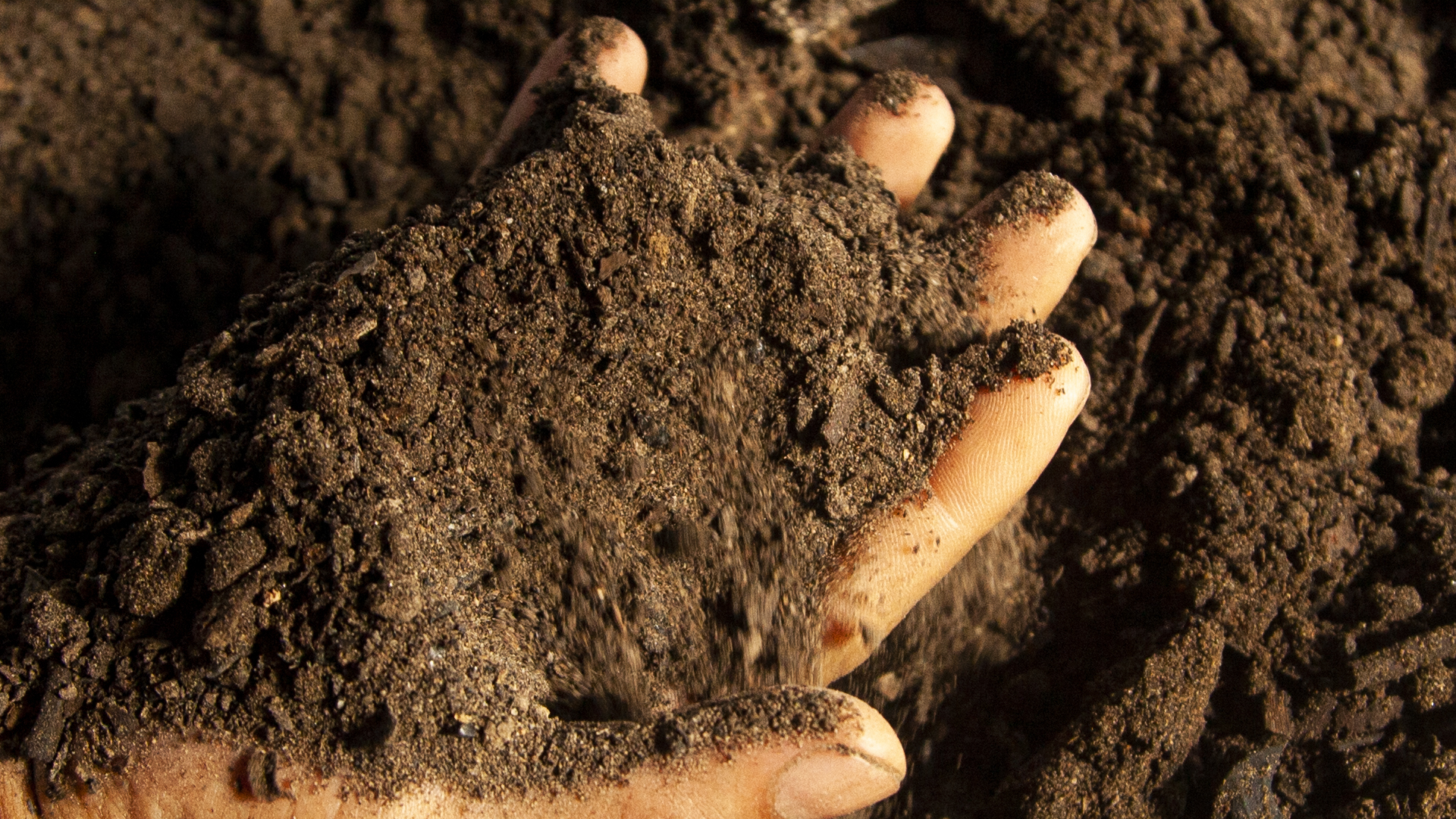
YANA ALLPA
In the heart of the rainforest of the Brazilian Amazon there is an extraordinarily fertile soil known, in Portuguese, as terra preta do indio (black soil of the Indians). These soils, which allow for permanent, crop-rich agriculture, are still used by many rural farmers in Brazil. Archaeological investigations have accumulated evidence that these ancient soils, full of broken ceramics, are “anthropogenic” in nature, or “cosmogenic” as we prefer to call it, and are associated with pre-Columbian settlements.
Experts have calculated that the black earth could support a population approximately equal to that of the Amazon basin today. And this statement radically changes the knowledge we had about the pre-Columbian Amazon basin: that of a small population of primitive and nomadic tribes. Archaeological investigations have also caught the attention of soil scientist Johannes Lehmann of Cornell University in the US, who was intrigued by the black earth that archaeologists were excavating. Lehmann analyzed this soil with the idea that its reproduction was feasible and, in addition, he realized the possibility of recreating an amazingly fertile soil that would be a blessing not only for the farmers of the Amazon but also for the world. Lehmann not only confirmed the reports of local farmers about this soil, but also discovered the presence of a special type of charcoal, which he later called “biochar.” Later it turned out that this charcoal was an elixir for the soil. Biochar is porous, this property allows nutrients to adhere to it and not be washed away by torrential rains and, in human terms, biochar never decomposes: the oldest samples of this soil are 8,500 years old and the biochar found in it still lingers. But the most surprising thing that Lehmann found about biochar is that it has a powerful effect of capturing and reducing carbon dioxide (CO2). This, without a doubt, would contribute to reducing the immense amount of CO2 that is released into the atmosphere and which is also the main cause of climate warming. The ingredients that archaeologists have found in black earth are mycelia (i.e. micro fungi), biochar and fragments of broken pottery. Mycelia play a crucial role in soil: they make it alive and help break down organic matter. Another virtue of mycelia, according to biologist Teruo Higa, is their ability to cleanse the soil of toxicities, this includes heavy metals, antibiotics and hormones, which are digested and neutralized by their metabolism. Currently it is extremely urgent and necessary to have the benefits of black soil in the Amazon basin, this would have a great impact on small farmers who use slash and burn agriculture since the arrival of the Spanish (when the steel tools were introduced like the machete, and probably when all knowledge of the terra preta was lost). Well, since there has been great deforestation, particularly in the San Martín region (due to the exploitation of firewood, monocultures, oil exploration, cattle raising and mining) farmers only have a small fraction of the 50 hectares on average necessary for slash and burn agriculture to be sustainable.
Now the question of the ceramic fragments that are found throughout this black soil and not only in the great pre-Columbian cities of the Amazon is that of their roigin. An investigation, led by Frédérique Apffel-Marglin, which was initiated thanks to one of her indigenous collaborators, found that some indigenous Kichwa-Lamas elders continue to offer broken ceramics to the spirits of the food field at the time of planting within the context of a ritual. They maintain that their ancestors made such offerings and that, furthermore, when they cleane a new clearing in an old field, they discovered that it was full of remains of potsherds. The practice of these offerings, unfortunately, has been succumbing to the gaze of the dominant mestizo society, which considers such practices to be mere superstition.
It is also important to highlight how a pre-Columbian technology, which was interrupted in such a catastrophic way more than five hundred years ago, can provide concrete solutions to problems generated by modernity. If we want, then, to adopt pre-Columbian technology, it is important to pay attention to the wisdom of this people. The Kichwa-Lamas and the indigenous peoples of other places consider the Earth, the Cosmos, as well as the mountains as being alive and conscious and, like humans, possessing volition. For the Kichwa-Lamas, one addresses the spirits of the chakra with kinship terms such as: Mama Allpa (the soil), Pachamama (the Earth), Mama Killa (the Moon), Yakumama (the rains/water), Sachamama (the rain forest) and Tayta Inti (the Sun), among others. Humans who invoke them as relatives simultaneously express that they are part of the Earth and the Cosmos, and that these non-human spirit relatives nourish and keep them alive. Such awareness generates the desire to reciprocate and strive to care for the world on which all humans depend. Likewise, this conception of indigenous peoples teaches us, in times of a serious global ecological crisis, to develop a radically different way to look at nature, which, unfortunately, became in the eyes of modernity an insensitive machine, without will, that must be dominated and whose so-called “natural resources” must be used only by and for humans.
In the Sachamama center, the Yana Allpa project (name of the black earth in local Quechua) successfully developed the recreation of the terra preta. The studies that scientists did on the composition of black earth allowed us in our center to be successful in recreating it. Furthermore, a quick review of the literature teaches that the bulk of the organic components of black earth varies depending on location, that is, ancient pre-Columbian people used whatever fertile organic material was at hand. This allowed us to consider using local ingredients that are abundant and freely available in such a way that permanent agriculture works and is also adopted locally by small farmers. So, together with the center's technical staff, it was decided to use local ingredients.
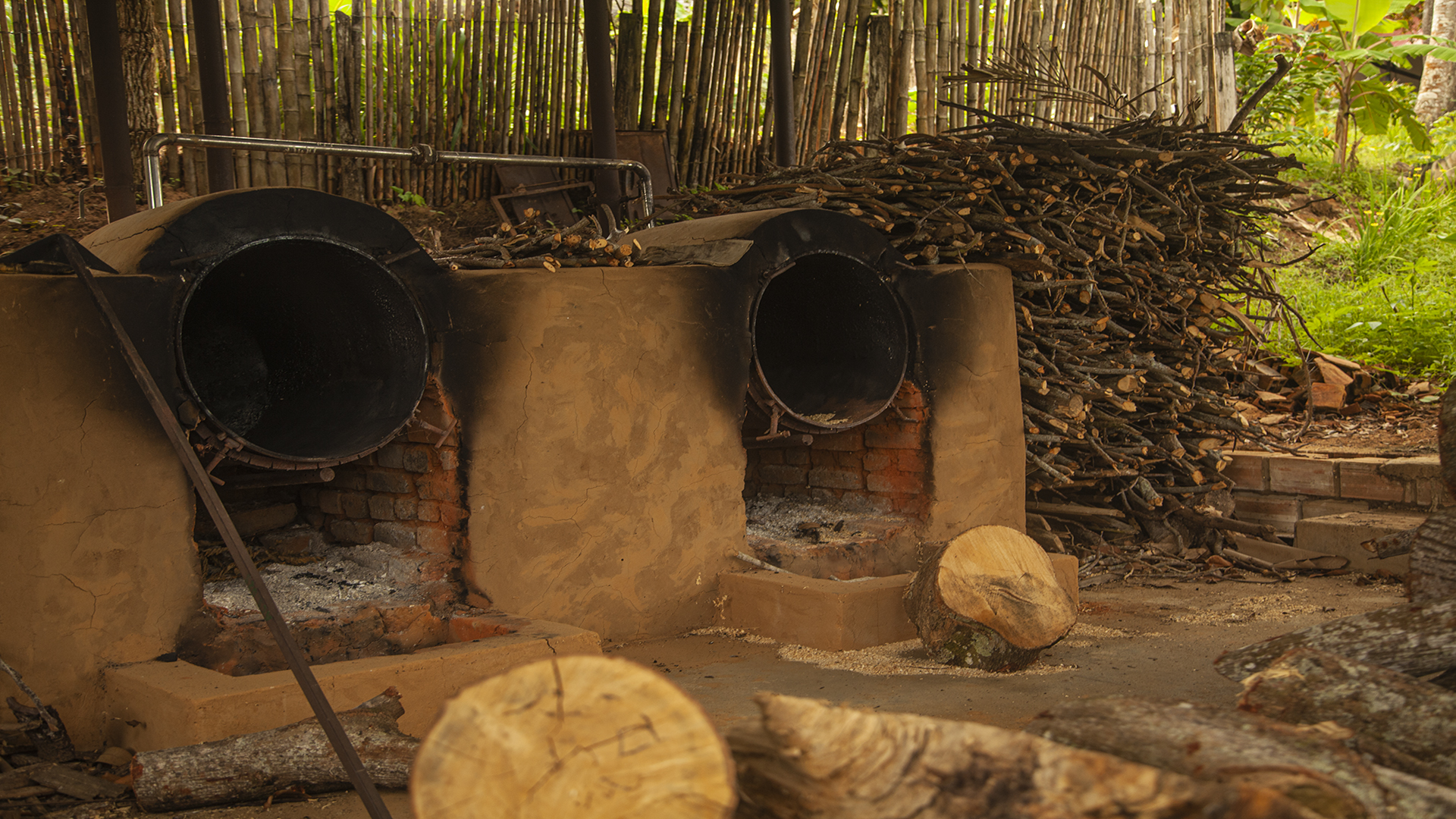
Because no one in the San Martín region had heard of biochar, they began to build an oven to obtain biochar in the center, clearly taking into account what the function of this oven was (in the book Yana Allpa, 2019, it is described in more technical details as well as the process of recreating the black earth). For responsible production of biochar, agricultural waste is used as biomass that is carbonized at high temperatures (between 400°-600°C) with very little or no oxygen (so that the pyrolysis process can occur) in a hermetically closed container.
The Yana Allpa project aims to share the center's experience in the processing of black earth and contribute to taking the step from agrochemical agriculture towards regenerative agriculture that, in short, promises to benefit us all. The center has also been disseminating or training interested institutions or people about the Yana Allpa recreation process, as well as transferring this technology from pre-Columbian peoples to those interested.
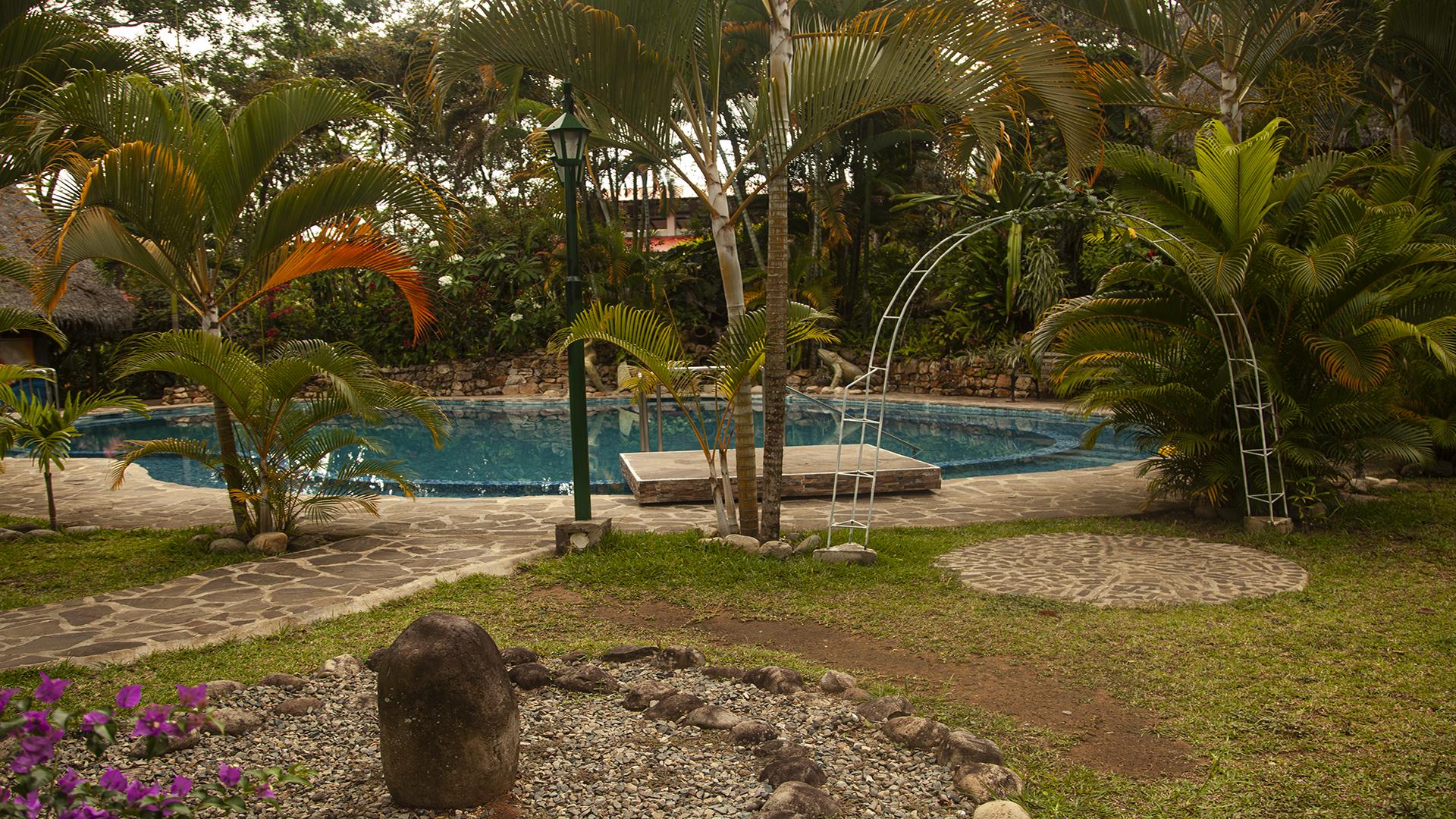
THE SACHAMAMA CENTER ASSOCIATION AND THE SANGAPILLA HOSPITALITY
The Sachamama Center Association is a non-profit organization whose mission is to teach, research and publish on cloud forest regeneration, local healing traditions, the Quechua language, the culture of the Kichwa-Lamas and ancient sustainable and organic agricultural practices. . ACS has one hectare of mountain land that is located at the southern end of the city of Lamas, a city located on a high ridge in the tropical foothills of the northern Peruvian Andes.
Dr. Frédérique Apffel-Marglin, professor emerita of anthropology at Smith College, founded the center in 2009, and since then, numerous courses and university programs have been held at the Sachamama Center, including programs with the University of Massachusetts, the University of British Columbia, and the University of Victoria.
Randy Chung Gonzales offers workshops on Amazonian Medicinal Plants and other types of workshops on both mental and physical health.
Frédérique Apffel-Marglin, PhD is Professor Emerita, Dpt. of Anthropology at Smith College She founded ACS/SCBR in the US with the field campus in the Peruvian High Amazon in 2009 She co teaches Study Abroad Courses with other university faculty at ACS/SCBR.
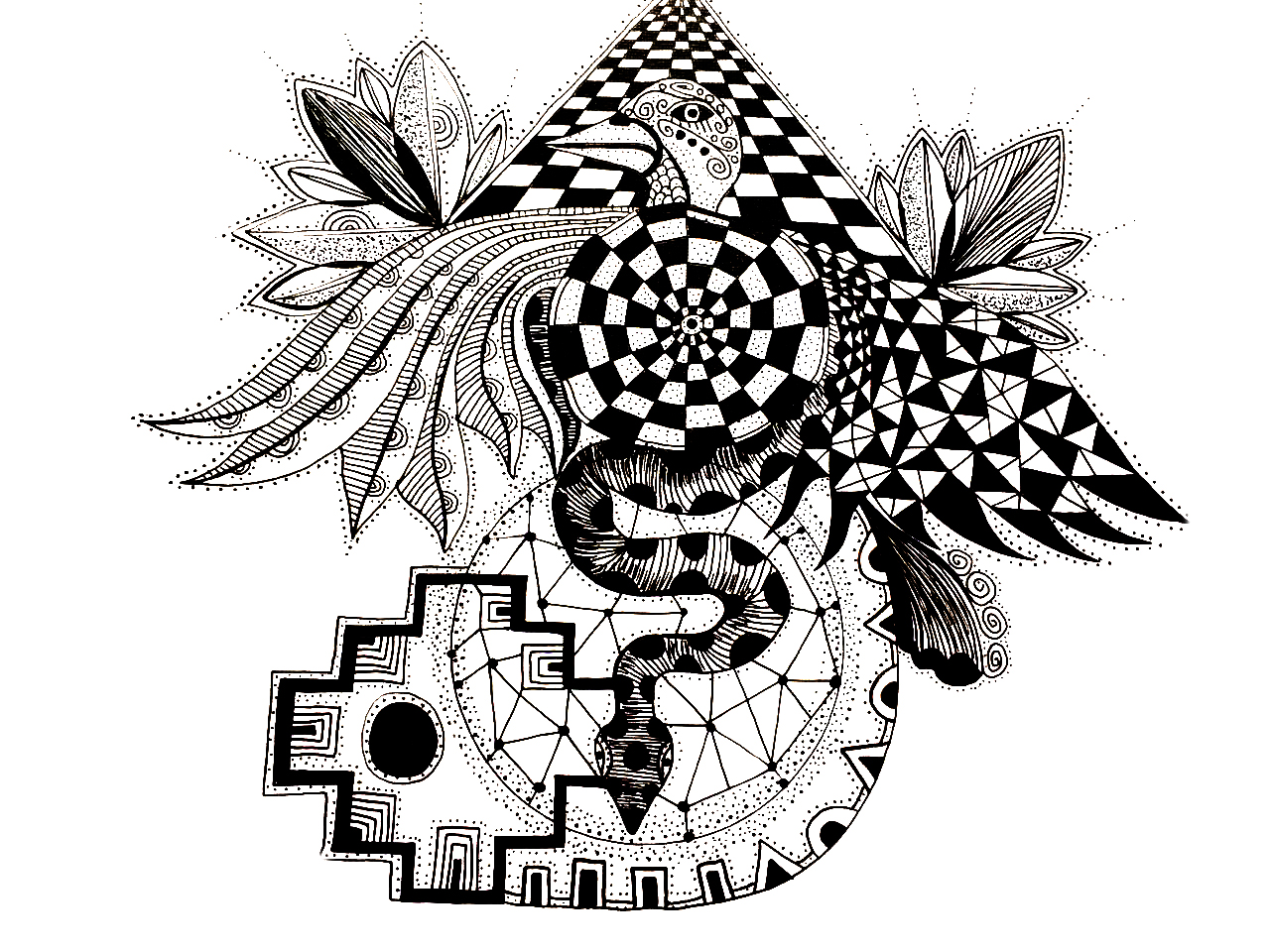
MEDIA
Books
Subversive Spiritualities
by F. Apffel-Marglin
published by Oxford University
Press, New York in 2011
Selva Vida
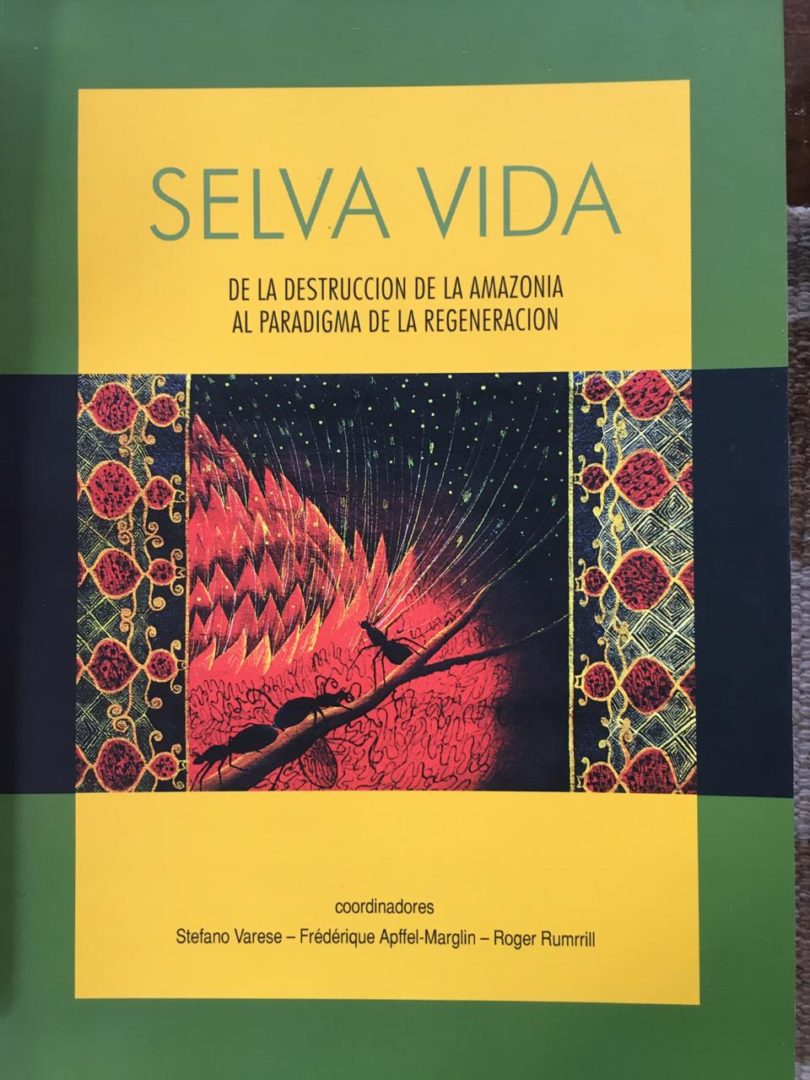
Edited with Stefano Varese, Frederique Apffel-Marglin and Roger Rumrrill
Stefano Varese and Roger Rumrrill (members of ACS board of directors)
Published by IWGIA, UNAM and Casa de las Americas in 2013.
Sacred Soil

by Robert Tindall, Frederique Apffel-Marglin and David Shearer.
Published by North Atlantic Books in 2017.
Yana
Allpa

Translation into Spanish of "Sacred Soil".
Published in Lima, Peru by Apus Graphs in 2019
Contemporary Voices
from Anima Mundi
by Frederique Apffel-Marglin and Stefano Varese
Published in New York by Peter Lang Academic Press in 2020
Iniciación
Chamánica
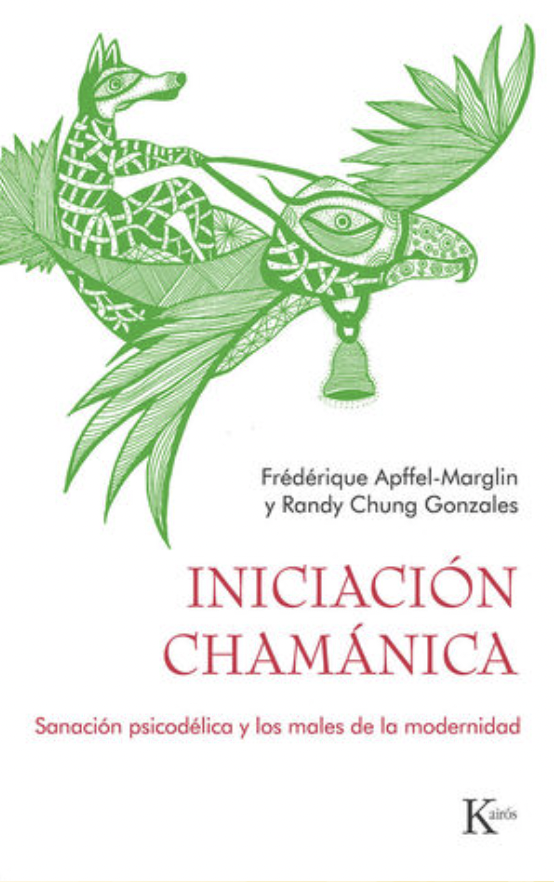
by Frederique Apffel-Marglin and Randy Chung
Published by Editorial Kairos in 2022
Initiated by
the Spirits
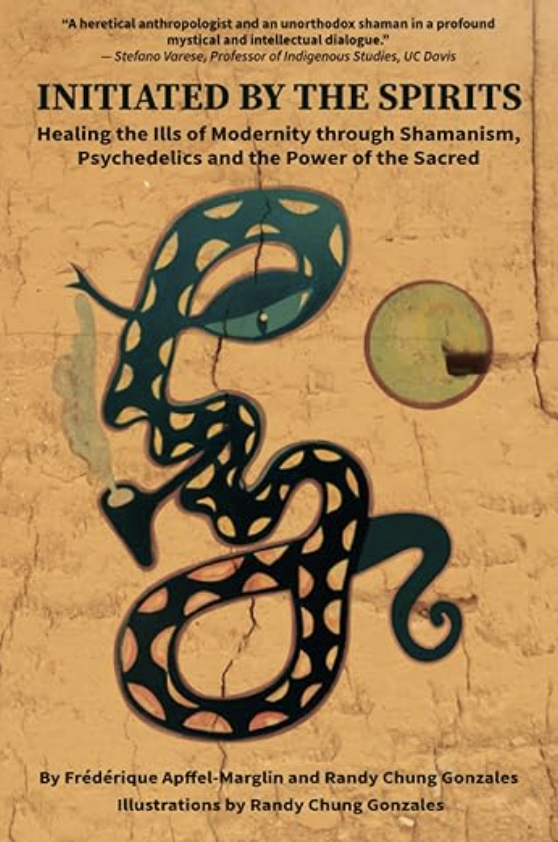
by Frederique Apffel-Marglin and Randy Chung
Published by Green Fire Press in 2023
Gallery
Videos
CONTACT
ACS is situated in the Peruvian High Amazon town of Lamas in the department of San Martín, a half hour by car from the airport of the city of Tarapoto. Tarapoto to the North East of Lima is served by three airlines: Lan, Star Peru, and Viva Airlines. There are several flights daily from and to Lima. The flight is about one hour and is direct. If you contact us before hand we can arrange to come and pick you up.
Our snail mail address in the field station in Peru is: Asociacion Centro Sachamama, Jr 16 de Octubre 114, Barrio Suchiche Lamas; Dpto. de San Martín; Perú.
Tel. in Lamas, Peru: (51 42) 54 30 04
Tel. in the US: (617) 800 3840.
E-mail: [email protected]
President in Peru: Randy Chung Gonzales:
Tel: 957 810 470
E-mail: [email protected]
President in US: Frédérique Apffel-Marglin
E-mail: [email protected]


